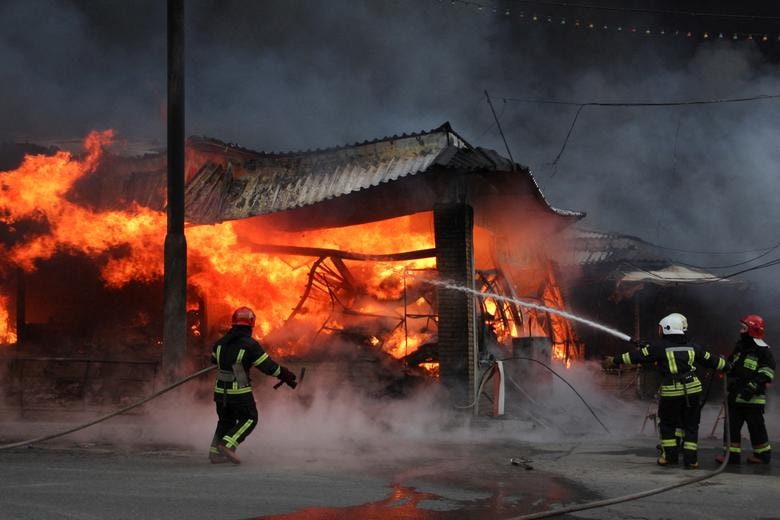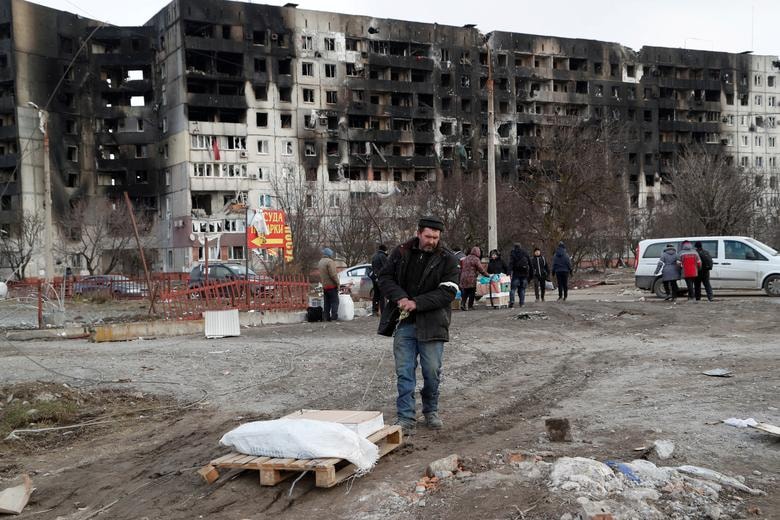Initial damage to Ukraine's economy from conflict with Russia
The conflict with Russia has caused heavy losses to the Ukrainian economy from business, finance, import and export to infrastructure and energy.
Sławomir Matuszak, a senior scholar on Ukraine, Belarus and Moldova, commented on the website of the Center for Oriental Studies (Poland-PISM.pl) recently that, in the context of the ongoing conflict, it is extremely difficult to estimate its consequences for the Ukrainian economy, but the damage could reach hundreds of millions of dollars per day.
 |
| Barabashova market burned in Kharkiv, Ukraine due to conflict on March 17. Photo: Reuters |
Business and finance
According to Mr. Matuszak, the conflict has forced many businesses and industrial plants in Ukraine to suspend or limit their operations. Russia has blocked Ukrainian ports - the gateway for the export of the most important commodities (steel and steel products, grain and food) - causing their prices on the world market to increase significantly. In the coming weeks, Ukraine may face fuel shortages, which will worsen the economic situation.
The Ukrainian president's office recently said that 50% of the country's companies have stopped operations, while the rest are operating at a limited capacity. Some of the largest metallurgical plants, including two in Mariupol, and plants in Kryvyi Rih and Zaporizhia, have stopped production because they cannot export due to port blockades.
The activities of enterprises are also affected by the military actions and the continuous air defense alert. The Ministry of Economy of Ukraine announced that it will publish preliminary GDP estimates after 1 month of conflict (February 24 - March 24, 2022). The International Monetary Fund estimates that Ukraine's GDP will fall by 10%, assuming the conflict ends in the near future. If it is prolonged, the decline could reach 25-35%.
According to Ukrainian Finance Minister Serhiy Marchenko, the conflict has caused a significant decrease in the country's budget revenues, especially customs duties (state budget revenues are only 15% of peacetime levels).
Economic activity has also been paralyzed by the large number of displaced people. More than 2.7 million people have left Ukraine. The number of internally displaced people is not yet known, but it is certainly several million (about 2 million left Kiev). The authorities have had to call on small and medium-sized enterprises to return to work, if circumstances allow.
The transport of food and medicine, as well as the transport of goods by road, is complicated by the presence of numerous “blockades”. These controls have significantly extended delivery times and disrupted logistics chains, resulting in a partial paralysis of internal trade. Recognizing this problem, the authorities have announced a minimum restriction on the number of checkpoints.
Ukraine's financial system remains stable. On February 25, the National Bank of Ukraine (NBU) froze the exchange rate of the national currency at 29.25 hryvnia/USD. Despite the declaration of a state of war, the NBU did not increase the main reference rate (10%). At the end of February 2022, Ukraine's foreign exchange reserves stood at $27.5 billion. To meet budget needs, the Ukrainian government decided to issue 20 billion hryvnia ($685 million) in war bonds, which the NBU bought on March 8. About half of the bank branches remain open, and to avoid cash shortages at ATMs, Ukraine has limited cash withdrawals.
It seems that in the short term, this move could help solve the problem of access to money. Both the NBU and the Office of the President of Ukraine have called for the maximum use of cashless transactions due to difficulties in transferring money to some regions.
Import/export issues
The conflict with Russia has led to the blockade of Ukrainian ports on the Black Sea and the Sea of Azov, which account for nearly 70% of Ukraine’s exports. In addition, Ukraine is a major global exporter of food (mainly oilseeds and grains), mainly by sea and to the Middle East, India and China. This means that Kiev is losing about $180 million a day and is short of supplies of key commodities (mainly coal, gasoline and diesel).
Ukraine will face a fuel shortage in the coming weeks due to import restrictions. Ukraine alone is self-sufficient in about 50% of its gasoline needs, 15% of its diesel and 20% of its liquefied petroleum gas (LPG). About two-thirds of Ukraine’s gasoline and diesel fuel are imported from Belarus and Russia, with deliveries still pending.
Ukrainian authorities have not said whether alternative sources of supply have been found or to what extent their reserves can meet domestic demand. So far, the conflict has damaged only one major fuel depot (in Wasylków near Kiev), while the Kremenchuk refinery is also operating. To reduce skyrocketing fuel prices, the Ukrainian parliament is working on changes to tax regulations.
 |
| Many buildings in Ukraine were destroyed due to the conflict. Photo: Reuters |
About infrastructure
On March 7, the Ukrainian Ministry of Infrastructure estimated the damage to the transport network (roads, bridges, railways, airports) at $10 billion. In the two weeks of conflict, 63 hospitals and more than 200 schools have been destroyed or damaged, and the number is growing every day. On March 14, the Ukrainian Ministry of Economy announced that the damage had reached $119 billion. However, it is currently impossible to verify this figure. The conflict has led to increasing problems in the energy sector, but so far Ukraine's gas system and electricity grid have not been paralyzed.
In short, Mr. Matuszak believes that the extent of damage to the Ukrainian economy will depend on how the military situation develops in the coming weeks. A significant reduction in trade activities and the fact that a large proportion of businesses do not pay taxes could lead to serious economic instability and public discontent. Therefore, the functioning of the Ukrainian economy will depend on urgent and flexible assistance from the West. Currently, according to estimates by the head of the Ukrainian Parliamentary Finance Committee Danyl Hetmansev, the total amount of assistance received and announced by Ukraine in the form of loans and direct grants has reached about $25 billion. However, it is unclear how long this figure will sustain the Ukrainian economy.
